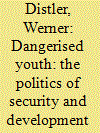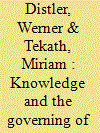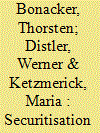|
|
|
Sort Order |
|
|
|
Items / Page
|
|
|
|
|
|
|
| Srl | Item |
| 1 |
ID:
165076


|
|
|
|
|
| Summary/Abstract |
International organisations, the national government and civil society alike have identified youth as a potential threat to the stability of the young state of Timor-Leste over the last decade. In this article, I ask how these actors define the danger of youth and what reasons they identify for the potential threat of young citizens for the society and state. Guided by a theoretical framework of Critical Security and Development Studies, I argue that while political manipulation as reason for youth violence was a prominent part of the security discourse in the years after the crisis in 2006, the discourse on the danger of youth in very recent international and national documents has been depoliticised. Despite decreasing numbers of youth-related violence, the threat construction has not vanished; rather, the language on youth has been adapted to the existing international discourse on violent youth as a threat to successful development. In this way, international and national actors have sustained the image of a society in need of management.
|
|
|
|
|
|
|
|
|
|
|
|
|
|
|
|
| 2 |
ID:
143799


|
|
|
|
|
| Summary/Abstract |
The problematic nature of biased knowledge held by professionalized experts and aid workers in statebuilding is already recognized. Yet we still lack understanding on knowledge formation and transfer in the everyday of statebuilding operations. I argue that the actors on the ground gain their knowledge in powerful and self-referential socialization processes. The aim of this article is to reconstruct via an interactionist theoretical framework, how German police officers, deployed for a maximum of 12 months, perceive and interpret other actors and their mission in Kosovo, how they gain this knowledge and how it relates to their work. I draw two conclusions: first, the police officers, both experienced and newcomers, share mostly negative attitudes towards local actors and the mission. Second, the most important mode of knowledge formation and transfer behind these similar attitudes is the informal interaction with experienced interveners and local actors, not official trainings or information. These informal modes of knowledge transfer have a limiting effect on the practice of statebuilding. New knowledge is difficult to gain in short-term deployment, instead stereotypes are reaffirmed. Interveners are not independent units and the social practice of an operation cannot simply be planned; it develops on the ground in specific forms.
|
|
|
|
|
|
|
|
|
|
|
|
|
|
|
|
| 3 |
ID:
190700


|
|
|
|
|
| Summary/Abstract |
While studies on the role of knowledge and expertise have seen a resurgence of interest in International Relations and in literature on peacebuilding and security governance, little is known how knowledge enters the governance routines after the initial establishment of peacebuilding operations. Taking the mandate decision-making process of MINUSMA and EUTM operations in Mali in the German parliament as case for our explorative study, we ask how knowledge has entered the parliamentary process and how various epistemic practices and epistemic agency shape this peacebuilding governance since 2013. Informed by an object-centred knowledge framework, we argue that the practices and types of agency involved mostly ‘lock-in’ the governing of robust peacebuilding in Mali in much broader foreign- and security policies routines. Epistemic practices are not primarily concerned with new impulses or critical analysis, but with rendering Mali governable as interventionary object. The epistemic authority of the government is dominant and we do not find much evidence that hegemonic knowledge is challenged. Intervening agents do extract certain knowledge via transnational channels from Mali, however, broader knowledge debates or the involvement of Malian agents are missing.
|
|
|
|
|
|
|
|
|
|
|
|
|
|
|
|
| 4 |
ID:
163325


|
|
|
|
|
| Summary/Abstract |
The United Nations has engaged in (neo)trusteeship statebuilding in two different contexts: post-Second World War decolonisation and after the Cold War. On both occasions, statebuilding aimed at preventing organised, large-scale violence. Nevertheless, these statebuilding efforts were confronted by several forms of violence, ranging from civil war to a high level of politically motivated violence. In this article, we ask how and why administrations in French Cameroon, New Guinea, Kosovo and Timor-Leste implementing (de)securitised such violence – by addressing it as a serious threat and imple-menting policies of protection, by portraying it as something manageable or even by ignoring it.
|
|
|
|
|
|
|
|
|
|
|
|
|
|
|
|
|
|
|
|
|